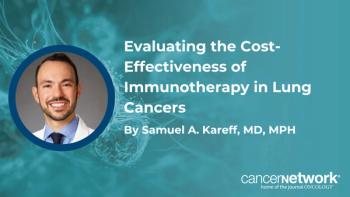
Oncology NEWS International
- Oncology NEWS International Vol 14 No 8
- Volume 14
- Issue 8
Intermittent Erlotinib With Docetaxel Shows Promise in NSCLC
This supplement to Oncology News International includes more than 15 reportson presentations made at the 41st annual meeting of the American Society of Clinical Oncology.Reviews focus on the use of targeted agents in non–small-cell lung cancer and other solid tumors,evaluating the novel therapies bevacizumab, cetuximab, bortezomib, erlotinib, and gefitinib, aloneand/or in combination with other chemotherapy agents. Continuing medical education credit isavailable by completing a post-test and evaluation online at www.cancernetwork.com/cme.
SACRAMENTO, California-Tyrosine kinase (TK) inhibitors suchas gefitinib (Iressa) and erlotinib(Tarceva) have proven effective in advancednon-small-cell lung cancer(NSCLC) as single agents but not, paradoxically,when used concurrentlywith cytotoxic chemotherapy. Now, asmall pilot study suggests that intermittentuse of erlotinib in combinationwith docetaxel (Taxotere) mayimprove outcomes when continuousadministration of the two drugs hasfailed.Angela M. Davies, MD, and colleaguesat the University of California,Davis, Cancer Center in Sacramentotested intermittent erlotinib with docetaxelin patients who had previouslytreated, advanced solid tumors. A totalof 42 patients took part in the study,and about half had NSCLC."The efficacy was very promisingfor this population," said Dr. Davies,an assistant professor of medicine inthe department of internal medicineat UC Davis (abstract 7038). Amongthe 20 evaluable patients with NSCLC,there were four partial responses, onecomplete response, five minor responses,and two patients with stabledisease. Ordinarily one would expecta lower response rate to second-linetherapy in advanced disease, Dr. Daviessaid.Charles Rudin, MD, PhD, directorof the lung cancer therapeuticsprogram at Sidney Kimmel ComprehensiveCancer Center, agreed thatthe number of responses in this studywas encouraging. "The responses arecertainly intriguing in this phase Icontext," he said.Different ErlotinibDoses, SchedulesThe study included two simultaneousphase I trials, or arms, to testdifferent doses and schedules of erlotinib.Docetaxel was given every 21days in both arms. Erlotinib was givenweekly in one arm, on days 2, 9, and16; in the other arm, it was given daily,at lower doses, on days 2 to 16. On theweekly schedule, the maximum tolerateddose (MTD) of erlotinib was 600mg/m2. On the daily schedule, theMTD was 200 mg/m2. In both trials,the MTD of docetaxel was 70 mg/m2.Among patients receiving the dailydoses of erlotinib, there were fewertoxicities and more responses thanamong those who received the higherweekly doses. Dose-limiting toxicitieson both arms included febrile neutropenia,mucositis, and diarrhea.Cell Cycle EffectThe efficacy of intermittent dosingmay be related to the effect of erlotinibon the cell cycle, Dr. Davies said. In amodel developed by coinvestigatorPaul H. Gumerlock, PhD, also at UCDavis, erlotinib induces arrest at theG1 phase of the cell cycle, thus blockingthe M-phase where docetaxel isactive. When docetaxel is given first, itinduces M-phase arrest and apoptosis,which is then enhanced by erlotinib'sactivity at the G1 phase, accordingto this model.The daily erlotinib regimen is nowbeing tested as second-line therapy inadvanced NSCLC in a phase II trial atUC Davis. In addition, phase I trialsare testing both schedules with pemetrexed(Alimta) rather than docetaxel,Dr. Davies said.Exploring Schedules, EGFRMutational StatusIn his discussion, Dr. Rudin notedthat other studies are exploring differentschedules for possible combinationsof TK inhibitors and chemotherapy.For example, researchers atMemorial Sloan-Kettering CancerCenter in New York, he said, havefound that erlotinib given immediatelybefore, rather than after, docetaxelshows promise."Many schedules can be rationalized,"he said. "Several are supportedby preclinical data. What is going to bethe optimal schedule? I think time willtell."Dr. Rudin also stressed the importanceof determining whether patientshave the mutations in epidermalgrowth factor receptors that have beenshown to be targets of gefitinib anderlotinib: "I want to emphasize thatmutational status may dictate the optimalcombination and particularly theoptimal schedule of these agents," Dr.Rudin said.
Articles in this issue
over 20 years ago
Erlotinib Shows Early Activity in Liver Cancerover 20 years ago
Erlotinib Shows Promise as First-Line Therapy, Phase II Data Showover 20 years ago
Bevacizumab/Erlotinib CombinedBoost Responses in Renal Cell Caover 20 years ago
New Multi-Targeted Drugs Are Moving Through the PipelineNewsletter
Stay up to date on recent advances in the multidisciplinary approach to cancer.
Related Content




Optimizing the Use of Hypofractionated Radiotherapy in Lung Cancer Care










































